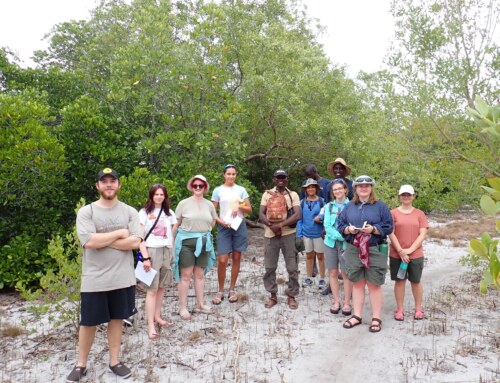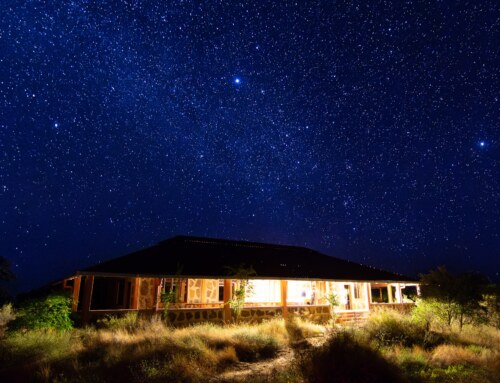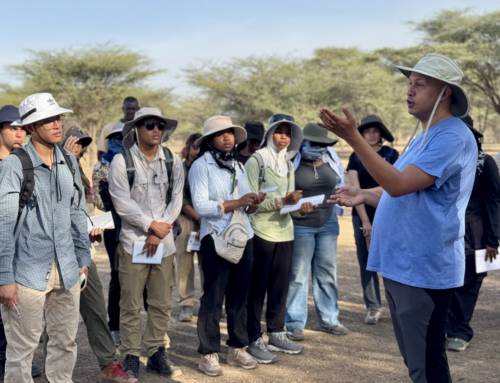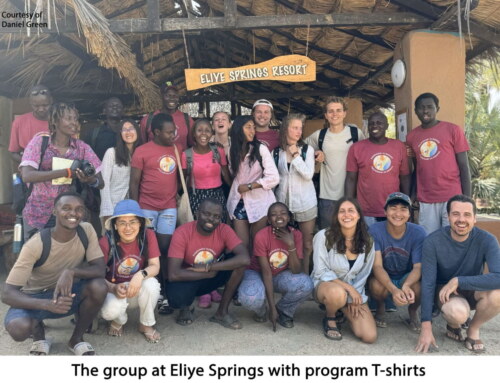
Our last week at Mpala was an eventful one. Students learned about the various effects of human-wildlife interaction, pastoralism, and the effects of climate change on the ecosystem. On Monday, Sandy Oduor, a researcher working with Mpala Elephant Project, accompanied students into the field to study the elephants. The immense droughts in recent years, coupled with human activities like poaching, have negatively impacted elephant health. Sandy studies the stress levels in the elephant dung by analyzing the fecal glucocorticoid metabolite.

Students walking down by the elephant’s water-point. Photo credit: Medina Lubisia.

Sandy giving a lecture on elephant group size and history. Photo credit: Medina Lubisia.
On Tuesday, the students had a lecture on domestication of plants and animals. Domestication was the beginning of agriculture. Due to available resources all year round, this resulted in increased human populations. Dr. Martins, an evolutionary biologist and conservationist, emphasized the importance of embracing and conserving biodiversity. For instance, farmers are encouraged to keep bees, which are ecological engineers, as they play a big part in pollinating plants.
Later in the afternoon, we visited Il Motiok, a village north of Mpala, where we interacted with the local pastoral community and learned more about human-livestock interaction. Students were excited to learn about pastoralism, and the various gender roles associated with it. Men spend most of their time out in the field herding cattle and camels, while the women stay at home doing house chores and constructing manyattas (Maasai houses).

Becca and Amber at the village. Photo credit: Medina Lubisia.

Zak trying to get the goat pose for a photo. Photo credit: Medina Lubisia.

Emma loved the goat! Photo credit: Medina Lubisia.

Our academic director, Wambui, also accompanied us to the village. Photo credit: Medina Lubisia.

Joe and Michael looking at some necklaces and gourds. Photo credit: Medina Lubisia.

Joe found a cool walking stick. Photo credit: Medina Lubisia.

A group photo with some of the villagers. Photo credit: Megan McDaniels.
In preparation to hike Mt. Kenya, we had a mini-expedition on Wednesday by hiking Mukenya Hills. Located north of Mpala, it is one place that Kopje/inselberg rocks are found in the African savanna. The following day was spend on Mt. Kenya, where the students hiked and learned more about the temperate evergreen forest. Dr. Martins introduced students to the various types of C3 plants in the region that differ from the C4 plants at Mpala. C4 plants have a higher photosynthesis efficiency than C3 plants, because of the differences in carbon fixation, as a result of moisture availability and temperature intensity.

Dr. Martins and the students looking at festuca grasses. Photo credit: Wambui Mbogo.

A group photo at Old Moses Camp, Mt. Kenya. Photo credit: Megan McDaniels.
We travelled to Ileret on Saturday morning. The students are already adapting to the weather here, ready and excited to start the next module.

Stay tuned!!





